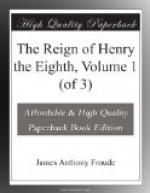Parallel to More’s retirement, and though less important, yet still noticeable, is a proceeding of old Archbishop Warham under the same trying circumstances. In the days of his prosperity, Warham had never reached to greatness as a man. He had been a great ecclesiastic, successful, dignified, important, but without those highest qualities which command respect or interest. The iniquities of Warham’s spiritual courts were greater than those of any other in England. He had not made them what they were. They grew by their own proper corruption; and he was no more responsible for them than every man is responsible for the continuance of an evil by which he profits, and which he has power to remedy. We must look upon him as the leader of the bishops in their opposition to the reform; and he was the probable author of the famous answer to the Commons’ petition, which led to such momentous consequences.[362] These consequences he had lived partially to see. Powerless to struggle against the stream, he had seen swept away one by one those gigantic privileges to which he had asserted for his order a claim divinely sanctioned; and he withdrew himself heartbroken, into his palace at Lambeth, and there entered his solemn protest against all which had been done. Too ill to write, and trembling on the edge of the grave, he dictated to his notaries from his bed these not unaffecting words:—
“In the name of God, Amen. We, William, by Divine Providence Archbishop of Canterbury, Primate of all England, Legate of the Apostolic See, hereby publicly and expressly do protest for ourselves and for our Holy Metropolitan Church of Canterbury, that to any statute passed or hereafter to be passed in this present Parliament, began the third of November, 1529, and continued until this present time; in so far as such statute or statutes be in derogation of the Pope of Rome or the Apostolic See, or be to the hurt, prejudice, or limitation of the powers of the Church, or shall tend to the subverting, enervating, derogating from, or diminishing the laws, customs, privileges, prerogatives, pre-eminence of liberties of our Metropolitan Church of Canterbury; we neither will, nor intend, nor with clear conscience are able to consent to the same, but by these writings we do dissent from, refuse, and contradict them."[363]
Thus formally having delivered his soul, he laid himself down and died.
CHAPTER V
MARRIAGE OF HENRY AND ANNE BOLEYN
Although in the question of the divorce the king had interfered despotically to control the judgment of the universities, he had made no attempt, as we have seen, to check the tongues of the clergy. Nor if he had desired to check them, is it likely that at the present stage of proceedings he could have succeeded. No law had as yet been passed which made a crime of a difference of opinion on the pope’s dispensing powers; and so long as no definitive sentence




